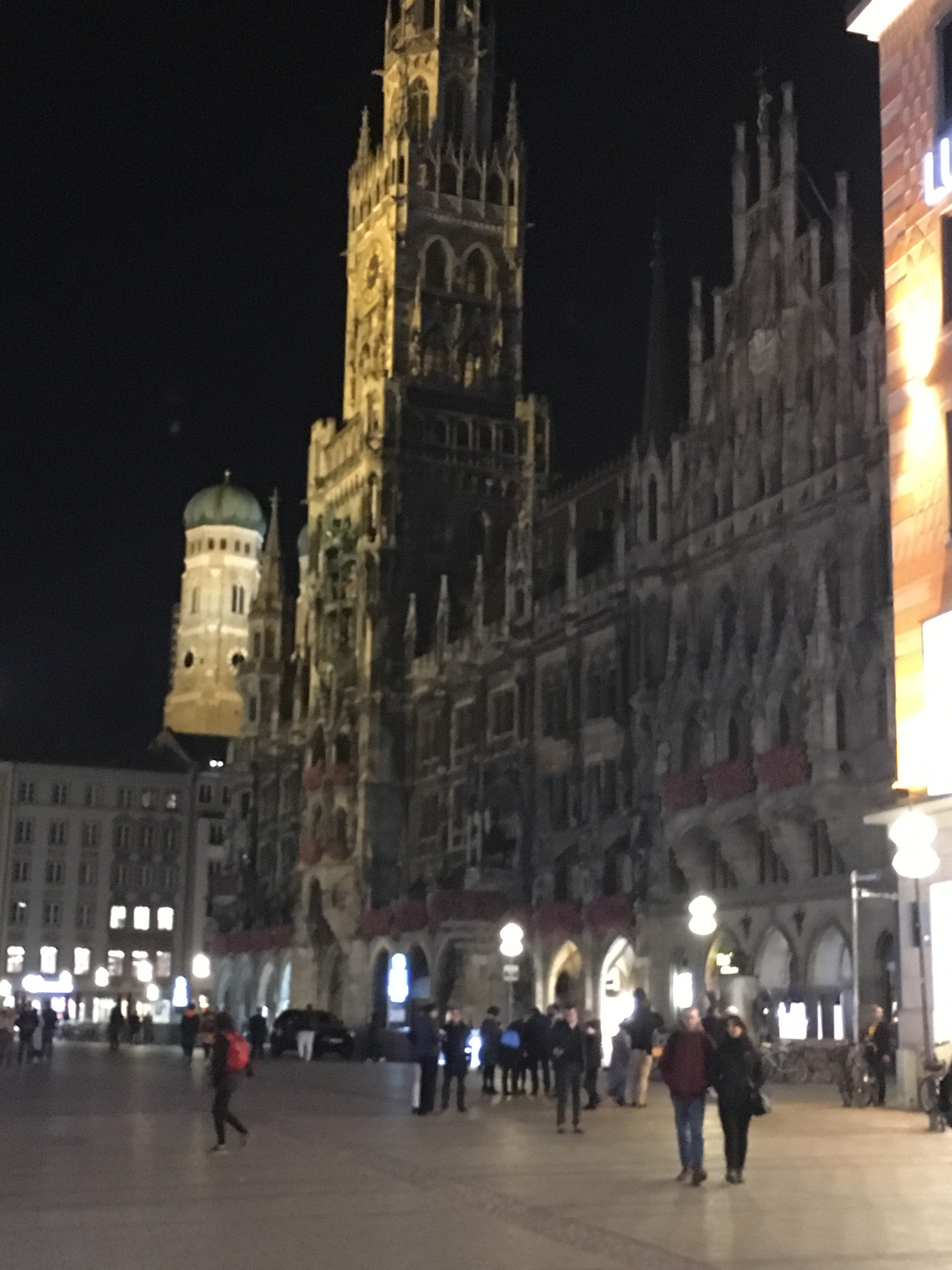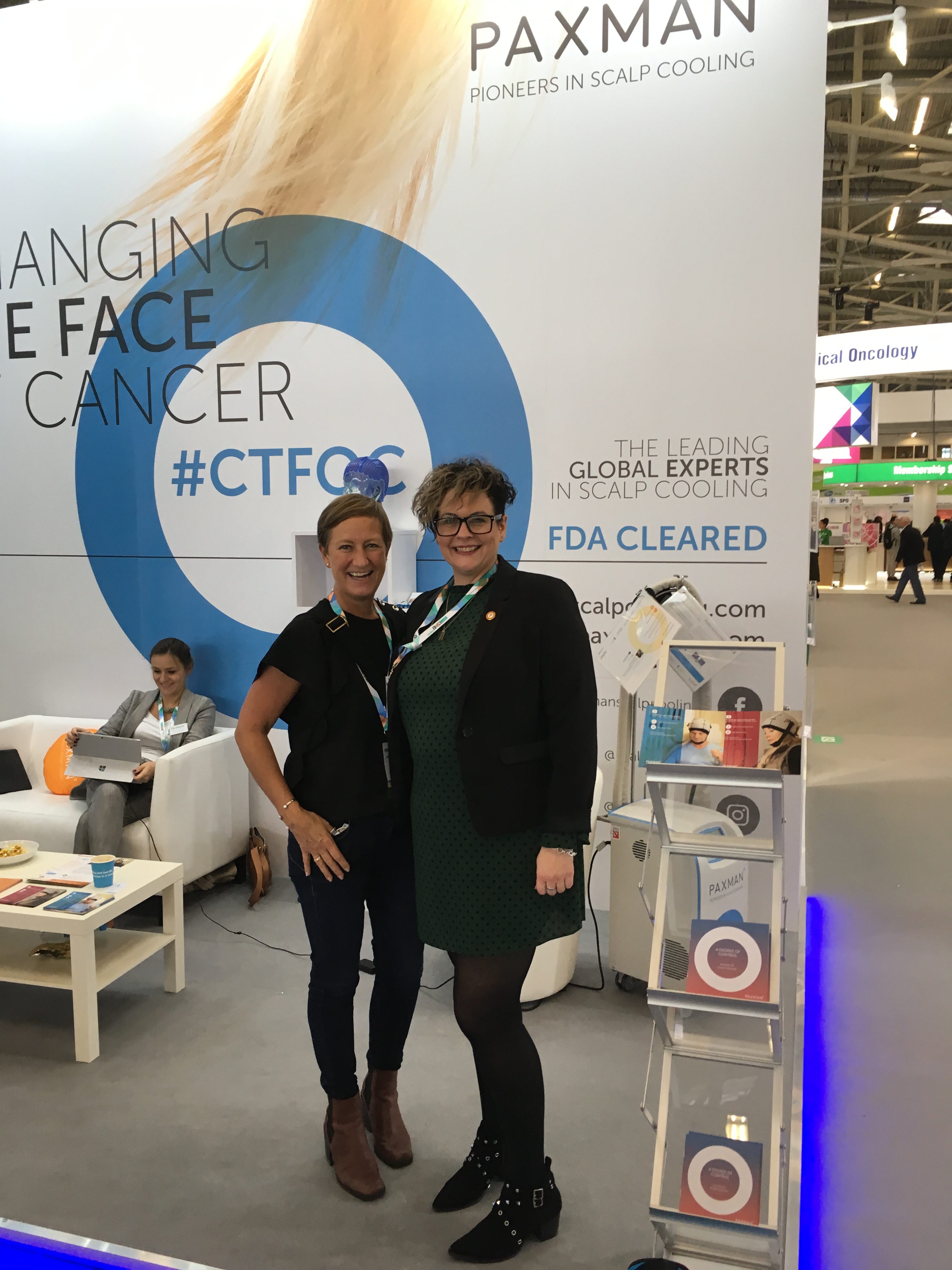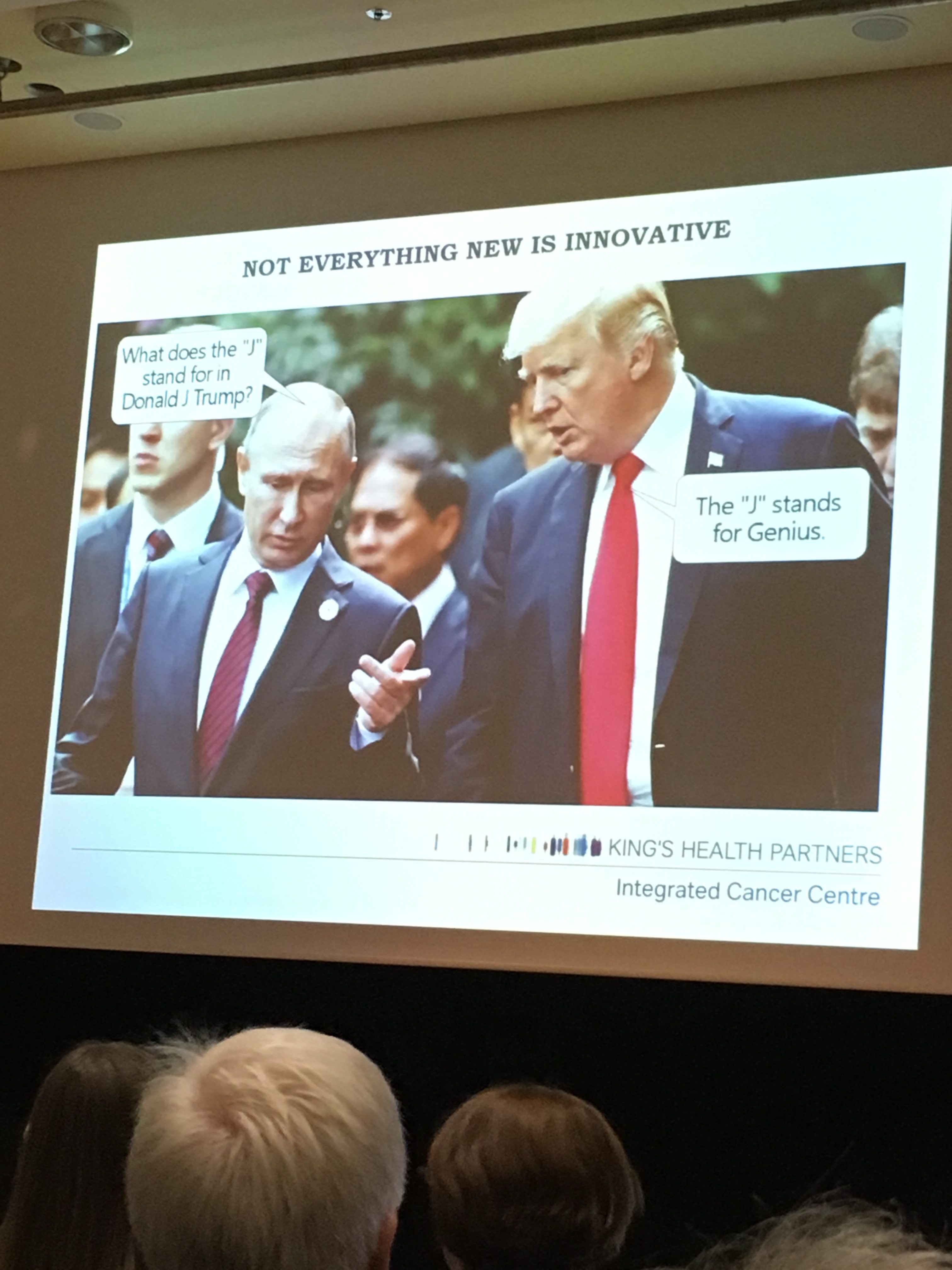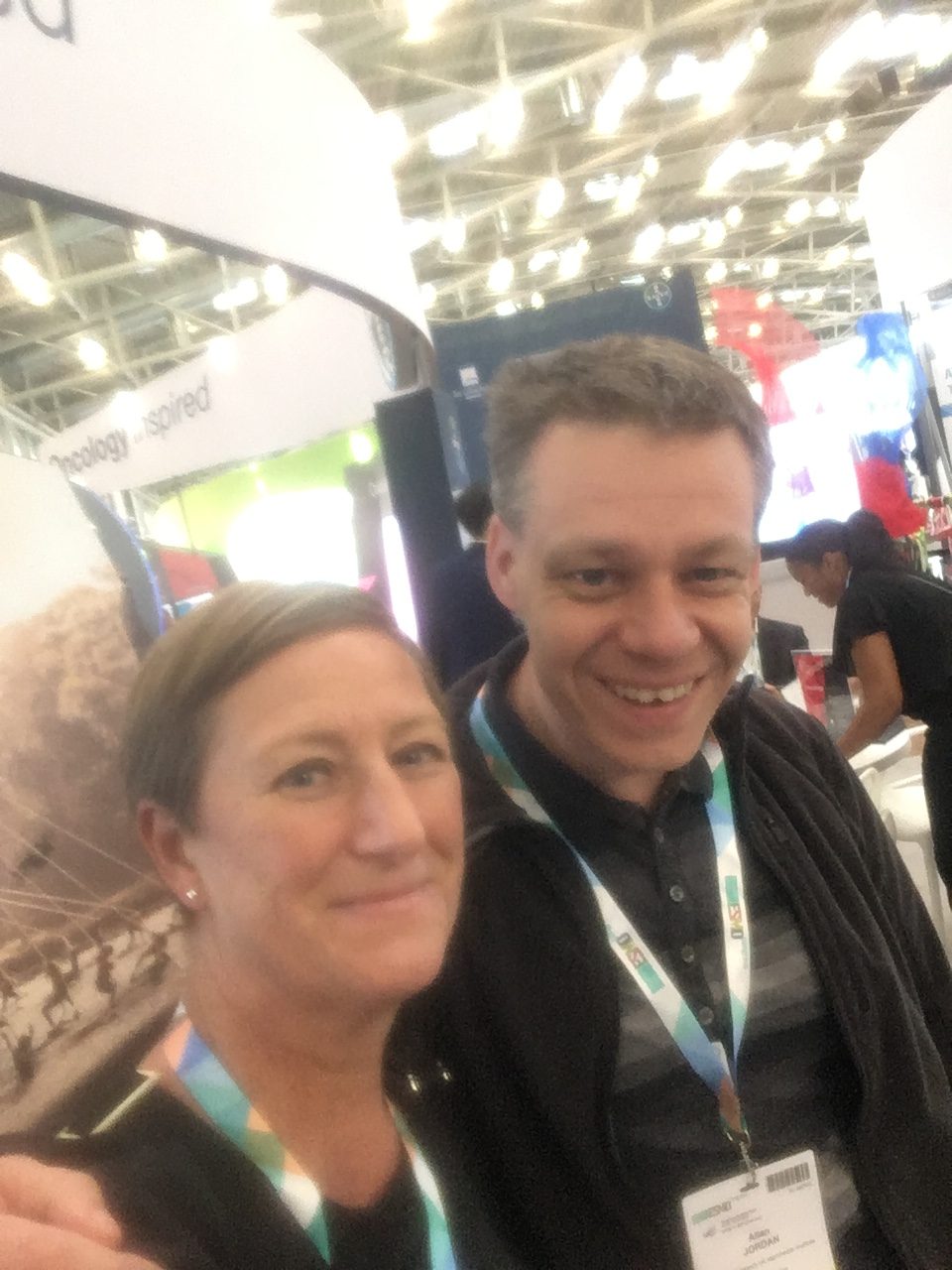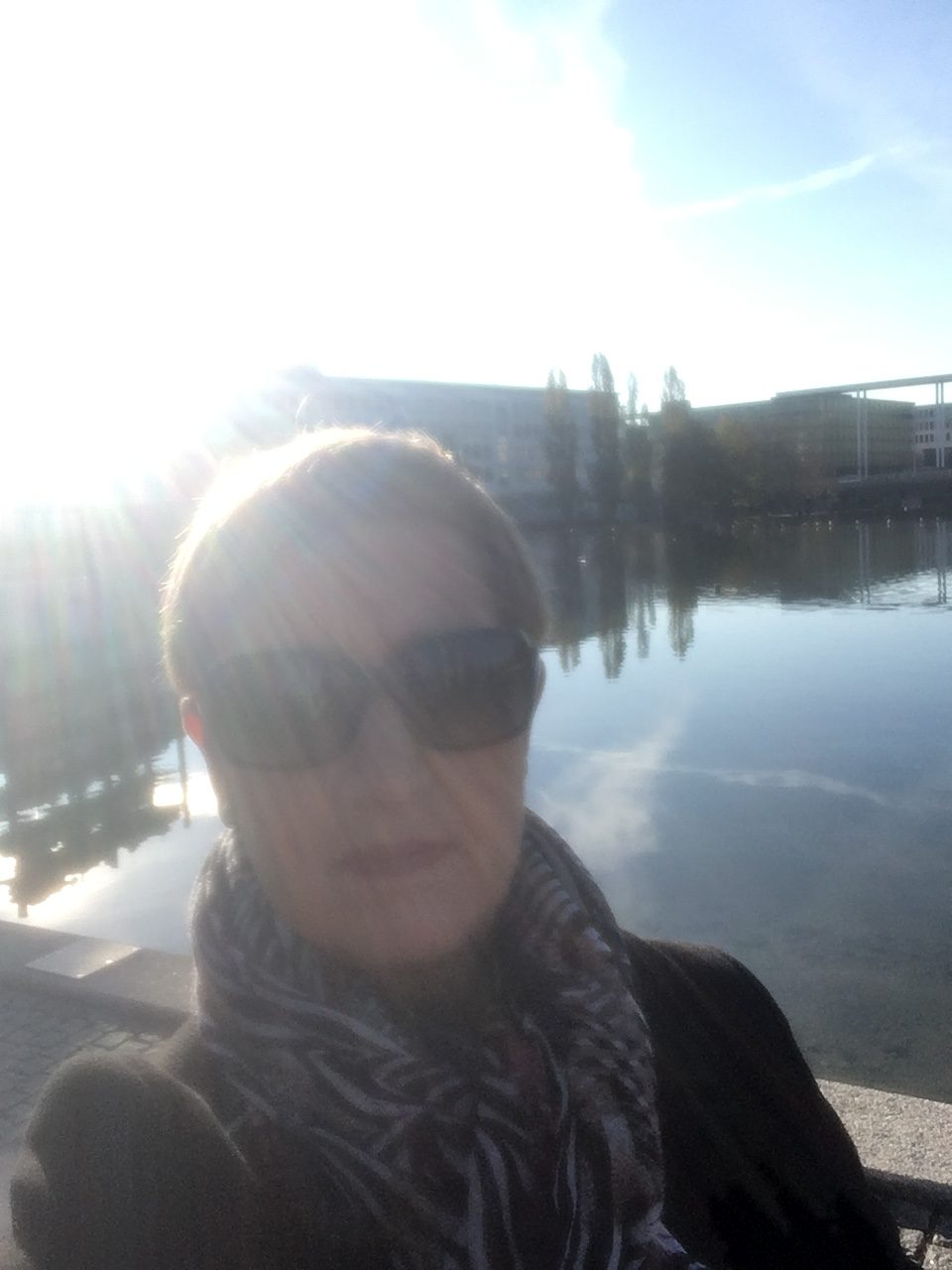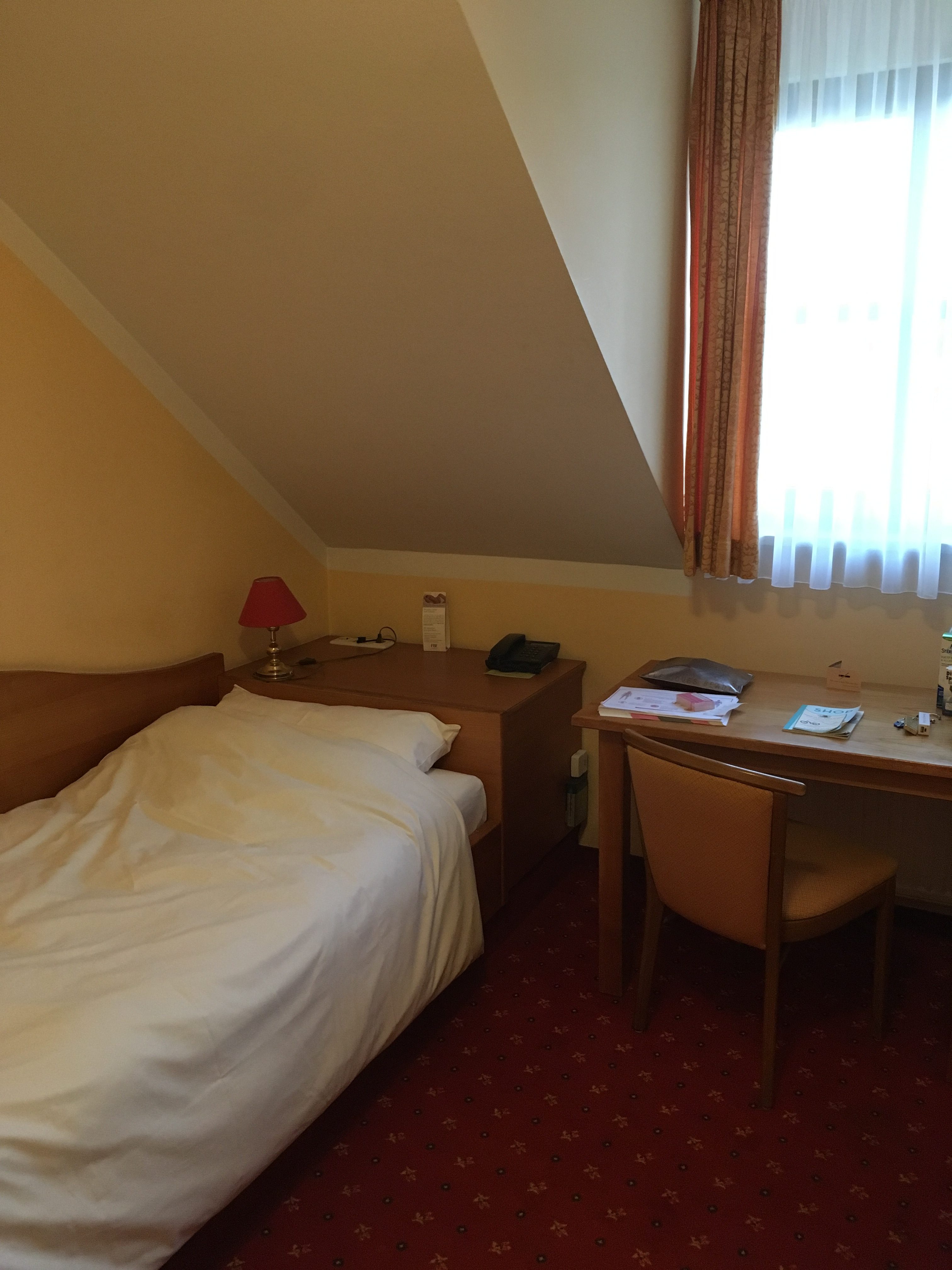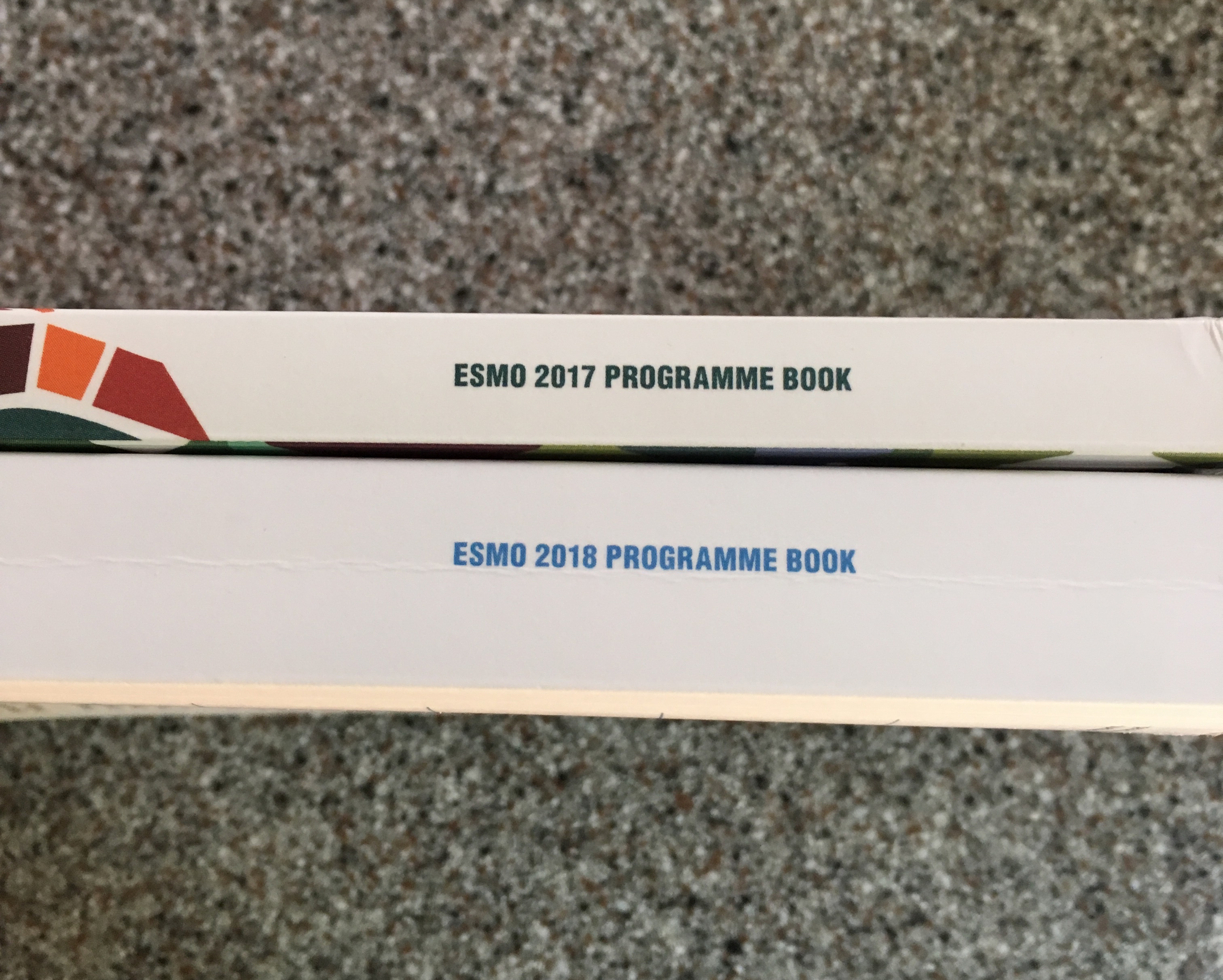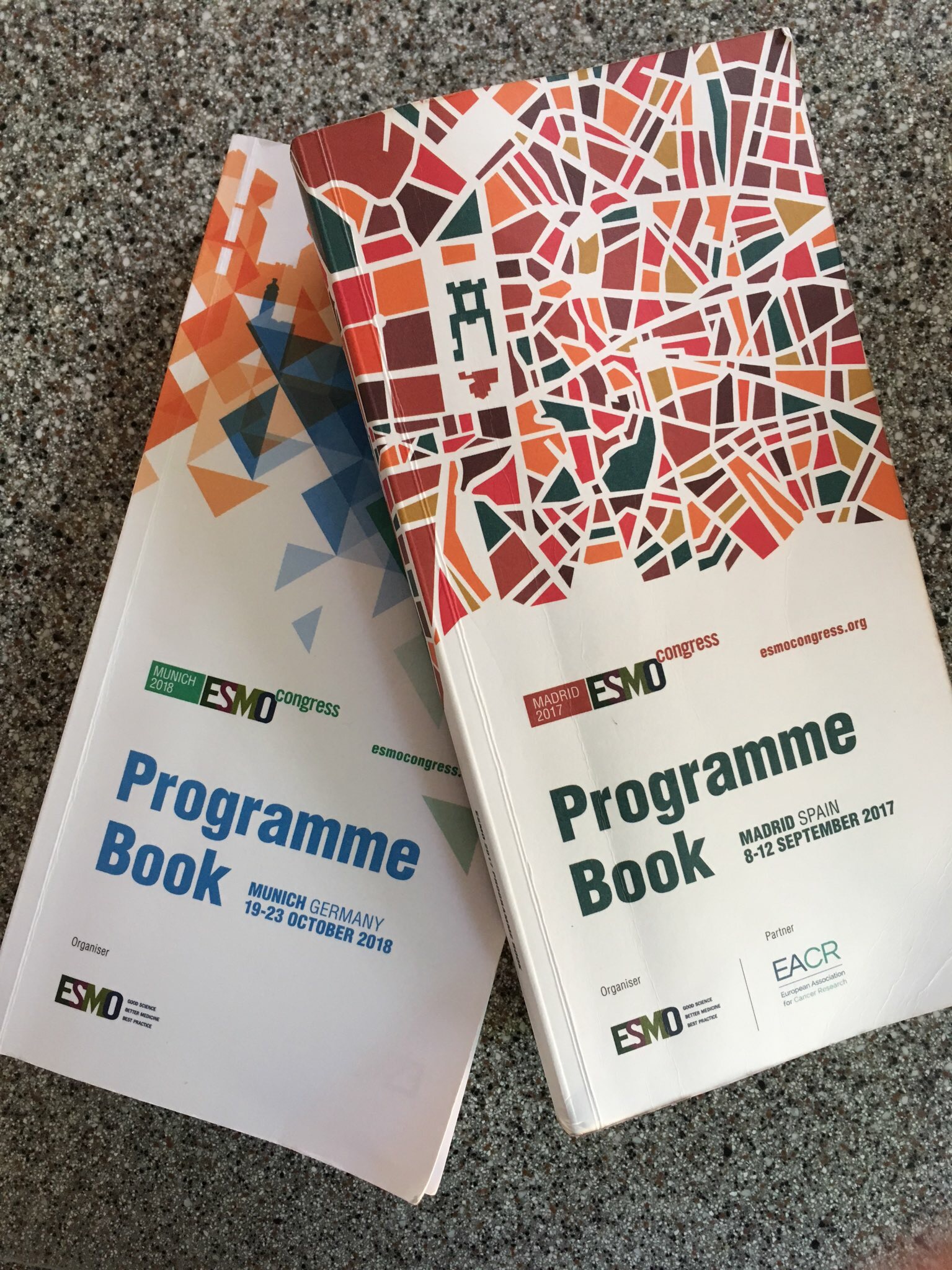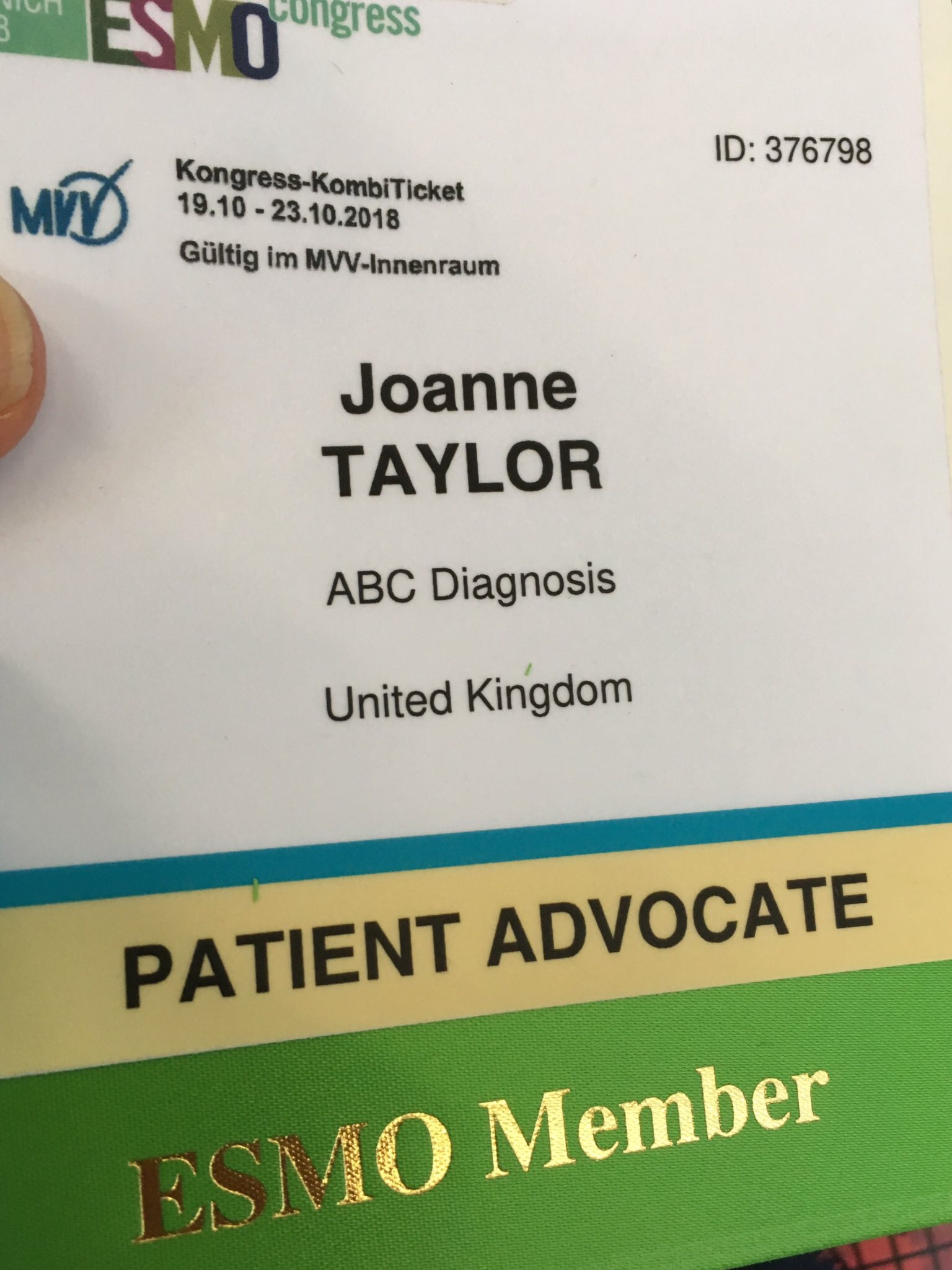Before ESMO2019 I wanted to give you a look at last years blog that I had written and never published until now. I was suppose to be at ESMO2019 but sadly I cannot make it to Barcelona this year and I will blog soon to explain why.
Anyway here’s an overview of last years conference! Looking forward to hearing news from ESMO2019!
I had picked up a virus at the weekend before I was flying to Munich and ESMO18. I was wiped out the Wednesday and in bed all day trying to get better for the flight the next day. I packed all the tablets, penicillin, cocodamol, ibuprofen – working out 28 tablets a day with various “eat with/ eat without” instructions. Throat spray that numbed the throat and anything I could get my hands onto make me feel better.
I boarded the flight on Thursday and Octoberfest had finished but there was a large party on a stag weekend and the stag was dressed in lederhosen. They were a jolly bunch.
The flight came and went without having any trauma like last year of any passengers fainting and feeling unwell in front of me thankfully.
I arrived in Munich and got a taxi to the hotel. The hotel was on the basic side of erm basic. No hairdryer, not even tea and coffee in your room. I thought in 2018 all rooms had tea and coffee available? Perhaps I’ve been too pampered? It wasn’t to be.
I emptied my bag and went down for some dinner in the restaurant. Nothing took my fancy. In Germany it seems to be a diet of meat, sausages, veal and all usually in some sauce, with potatoes and usually a bread dumpling.
I choose some vegetarian pasta which was just ok and headed back to the room . I finished off some work and then went to see if I could change rooms. The little one bedroom “nunnery” didn’t do anything for me apart from remind me of the series in the 1970s called Heidi, anyway they changed my room and instead I was given a double bed upgrade which I was excited to see but sadly wasn’t really an upgrade. It had a hairdryer in the room. No tea or coffee. 1980s dado rail and rag rolled green ish wallpaper. Anyway wasnt there for the hotel room.
I planned that night what sessions I was going to see the next day, which was opening day of the Confence. The only two channels of English speaking TV was CNBC news and Bloomberg American news to channel. BBC world news seemed to have been omitted from the channels for viewing. I polished up on my Dow Jones information, enough to send me to sleep.
A rough night as I was still feeling ill but woke the next morning and headed for the conference as there was an early morning breakfast welcome meeting for the patient advocates.
Friday
No English tea at the conference (there seems to be a theme here…) – I grabbed an orange juice and a German pretzel (no normal breakfast options) and sat down.
Bettina introduced the patient advocacy track and gave some pointers on how to get the best out of the conference and sessions to see. I met Chris from Swallows Charity (head and neck cancer patient) whom I met at last years conference in Madrid. There were a few familiar faces. Presentation over everyone headed out to meetings and I headed off to the ESMO lounge to catch up on work and see if I could find a cup of tea (unsuccessful) so went with water instead.
The ESMO lounge wasn’t like it was last year and there was the serious now lack of black English breakfast tea (was wishing I’d brought a few Yorkshire tea bags with me!)
First session was on genomics and I decided to ask a question at the end.
When you have collected all the data from the genomics project, are you sure you can provide the appropriate treatment for patients and what will the economic impact be? And…
When do you expect a new tumour marker for MBC?
Carlos Caldas mainly mentioned repurposing of drugs that they are doing this in Cambridge and they were doing whole genome sequencing with liquid biopsies.
I mentioned there was an issue with patents for repurposing and he agreed & said he would “move heaven and earth” to get a target for a patient *** note MBC patients!
Unfortunately, avoided the economic question like an MP. Sounds like Cambridge is the place to be for any genome sequencing for patients… Wonder when this will be rolled out across the UK?
The stratification on ER – and ER + breast cancers did show that while some recurred earlier some recurred out to 20 years so shows patients need to be vigilant.
I attended a couple of the Patient advocacy track sessions and then went for a walkabout in the exhibition hall where I bumped into Dr Allan Jordan – 26,000 people and I bump into a research scientist from Manchester. He works in the Drug Discovery Unit* and was one of the group that had to be moved to Alderley Park after the fire at (see my blog).
*Note Dr Allan Jordan Now works for Sygnature Discovery as Director of Oncology
A session on ctDNA was interesting and having positive results, hoping that this will be able to be used to check for relapse after surgery.
There was a patient advocacy track informal meet and I met Dr B there whom I met last year in Madrid (see my blog) I arrived late and they had already started on the nibbles, anyway had an hour of chat with Dr B and Kay English who is a stage IV melanoma cancer patient from Ireland. We had a good catch up and I had an early night catching a bus back to my hotel. It was only a 5 minute walk from the bus stop and good to know where it was for catching it in the morning.
Saturday
Sessions with result from trials of patient related outcomes of the CDK4/6 inhibitors and I didn’t attend the first patient advocacy sessions as I had seen the same session last year about pillars of an effective healthcare.
Called in the exhibition hall and met with Clare Paxman from Paxman who produce the Scalp Cooling caps for chemo patients. It was lovely to meet up as last time was 2 years ago we met and I had just had scalp cooling after having my sternum removed and when the hair had grown back I decided I didn’t want to be bald at Christmas so went ahead with scalp cooling. Although it was difficult and probably made worse due to my hair being so short, it did work and it felt good to keep my hair. I just had a small bald patch on the crown of my head which was due to the cap not having total contact with my head. When I was at ESMO16 I used Batiste dry shampoo with a colouring in to cover the patch up which worked well!
I attended the patient advocacy session on “cancer prevention” and there was some interesting info about shaping behaviours to get people into exercise or change their behaviour to reduce their risk of further cancer.
An interesting session by Professor Richard Sullivan about the countries involved in cancer research and mapping the countries.
Dinner was with Dr B around the corner from the event at a Vietnamese restaurant. It was fine but the smoke from the woks started to get in my throat with my cough and I ordered what I thought was a mild Thai curry and I coughed and wheezed with tears rolling down my for the whole of the meal! Not great when you also get back to your hotel and you are unable to have a nice cup of tea before bed….
Sunday
The sessions interesting today were about CAM (Cancer Alternative Medicine) and why do patients seek this? It was a very good session and explaining lots about what is actually seen as CAM. It blew away the myths and hopefully people have to tools to be able to question these alternatives. There are many people spending lots of money on CAM and patients need to have good information about them. The professionals always quoted that even if a patient decides to go down this route that the “door be left open” so that they can go back into the system if CAM fails. It’s never been on my radar to have CAM and I can see why people do this but traditional treatment is what has kept me alive, treatments with good surgeries and being diagnosed earlier than multiple mets is key I feel. Pascal Wolter from Belgium presented the first piece
The next piece presented by Edzard Ernst from Exeter UK, about pseudoscience and although there were many people in the audience laughing, it’s a reality and people are being scammed into paying for some homeopath with very little (virtually no) real research been done or disease evidence. It really is unacceptable and sadly no joke. People are making choices between conventional treatment and treatments like this causing deaths.
Henry Scowcroft from CRUK spoke about how to deal with “making news” and how to go about it and getting the “right treatment and options” for patients. The media has to be onboard with any pieces and try to get the information as accurate as possible. Experts need to challenge any pieces in the press, talked about reporting on CAM and the best way to deal with them.
The last session was Gilliosa Spurrier from Teilhet France on how to create a patient advocacy group and how they shared information across different countries by FB social media and then have certain advocates check out fake news stories and provide information about the best info.
I asked a question at the very end as I mentioned in the UK we are having problems with access to drugs, many patients are crowd funding for treatment that they know very little about.
How could we get Oncologists to discuss these with patients or is there somewhere as an impartial to advise patients on this?
Also that there are many Z list celebrities and the press who are giving poor information. Some charities also not addressing issues, I have seen one charity who on a video, filmed a patient looking at CBD oil alternatives. Not acceptable to have this in their media.
Another time at home at another large nationwide charity, I sat having lunch listening to a patient discuss how apricot kernels were highly beneficial to her treatment and not once did the person in charge address this issue, OR comment about how this patient would need to discuss this use with a professional. She heard it on a FB page… Highly worrying. It’s the tip of the iceberg.
Myself and Dr B made our way to the microphone.
I mentioned that in the UK patients were having problems in accessing drugs which was leading to the growth in Crowdfunding sites for patients accessing drugs abroad, which many know little about or have any research published. So I asked how can an Oncologist discuss this with patients or is there somewhere like an impartial website or advisor that patients can ask questions to to get good sound advice before they commit to travel or spending their pension or children’s inheritance on. Could they even access certain drugs by co-paying or on compassionate grounds?
The panel was totally aware of this and Henry Scowcroft from CRUK implied that there may be something in the not too distant future for patients in this context. Let’s hope so, as this is out of control and a growing phenomena.
Sunday night and I met Dr B for a trip to a Munich “beer house”. We had some traditional food (more meat and potato…) and drink and listened to the traditional bands playing. It was a lively place but I was still feeling rather rough with the virus so we finished our meal and headed to the train to get back to the conference centre as our hotels were nearby. Dr B’s bus was there when we arrived so he hopped on. I had a 1/2 hour wait so was around 12:30am when I got on it. I sat in the warmth and as per usual checked my phone and was busy watching a funny video about alternative therapies (watch you tube That Mitchell and Webb Look: Homeopathic A&E) that I missed my stop! I ran to the front in panic and asked him to stop. He was near the next stop and I asked him when the next bus was the other way “this is the last bus, there are no more buses”
So I got off and I had around a 2.5 mile walk at 12:45am along a dark road where I had to hold my phone torch to light it up as it was so dark. I had whatsappd Dr B to tell him where I was and what happened and pretty scary walking early morning on the outskirts of Munich in the cold, back to my hotel that I was finding on my phone map. 20% battery flashed up. A mile to go. 10% battery. I messaged Dr B “if my battery goes and you don’t hear from me in the next 1/2 hour then you need to call the police!” and there it died. I rushed walking, probably taking me around 20 minutes and got back to the room and plugged the phone in. 2 mins later popped up with a message from Dr B “are you ok???” “yes ive just got back and im ok! phew” Panic over he didn’t need to ring the police to say I was lost in Munich. I finally got to bed. Minus a cup of tea.
Monday
Last day and Clare Lait – Macmillan Community Physio in Gloucester (www.cancer-physio.com ) who helped me so much with the “disclaimer” for the #abcdretreat had asked me to do a piece for a presentation she was doing 2 days later and I filmed there a short 5 minute video about my disease in the bone and how I exercised and found the motivation and energy to exercise, what the challenges were and how I overcome them etc. My second take and I did the piece in one. Pleased but then I couldn’t get it over to her as the wifi was so poor so I went to see my friend Dan from VJ Oncology and he was able to sort out a link and finally emailed it to her.
Didn’t have much time to attend many other sessions as had to go and meet a couple of other people but saw a short session about liquid biopsies in cancer management. And the results are really positive that at some point they are hoping that these will be used for diagnosis, after and even for management of metastatic disease. The hope what I see is that these tests can be used to find disease early, primary and metastatic – therefore wouldn’t it be amazing if patients were diagnosed with oligometastatic disease instead of full blown progressed systemic mets and people can then be effectively treated for a chronic disease and some even “cured” without the additional doses of toxic chemo and therapies which affect quality of life?
We can only hope but this is what patients need. People are living longer with disease and better detection can only help to improve people’s long term survival instead of it being a death sentence of 2-3 years median life expectancy of metastatic disease.
I’m hopeful that there will be huge progress with this within the next 2-5 years.
A shuttle coach to the airport ( I will remember that for the next time!) and it was home to Jeff and my two children collecting me from the airport. It was good to be home and the first thing I did? A nice cup of tea.

